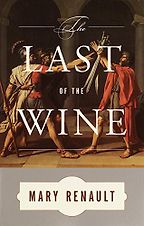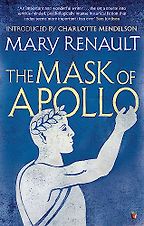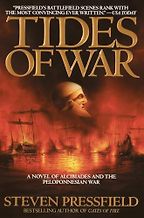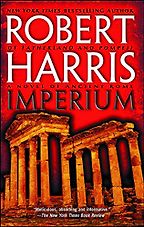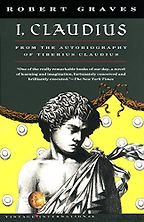Glorious Exploits, your Nero Book Award-shortlisted debut novel, is set in ancient Sicily during the Peloponnesian War. What drew you to historical fiction, and to the Classical era specifically?
I’ve always been fascinated by ancient Greece and ancient Rome, particularly ancient Greece: the myths, the drama, the history. I studied History and Classics at university, and as soon as I began to write, I had in mind that I might like to try something set during the period of the Peloponnesian War, because I’d read Thucydides’ History of the Peloponnesian War and was completely blown away by it.
Then I read a passage in Plutarch’s Life of Nicias, where he describes how some Athenian prisoners of war who had invaded Sicily and had been tossed into a quarry and left to die, survived by giving recitations from Euripides plays. This was because Euripides—more so than other dramatists like Sophocles—was beloved in Sicily. It was almost like a door opening; I realised this was what I wanted to write about. Not a grand war epic, but the story of two potters deciding to put on a play with prisoners of war and the consequences of that decision.
“Human nature hasn’t really changed; it’s still the same operating system”
The novel is set thousands of years ago but, although obviously culture, beliefs and technology all have a massive impact on the way people behave, human nature hasn’t really changed; it’s still the same operating system. Historical fiction is almost like speculative fiction in that you can create simulations, moral simulations, of how people might behave in radically different circumstances to our own, and yet, unlike speculative fiction, we actually have the evidence in the historical record.
Some of my favourite Shakespeare plays are the history plays. There are a lot of insights into your own present moment to be gained if you look back. Which is also what Homer was doing with The Iliad. All these original myths and epics were, in a sense, historical fiction. They were composed hundreds of years before they were finally written down. In a way, the distance this provides you with can be very useful.
That’s interesting. You worked with fantastically interesting raw material, in the Peloponnesian War. But you have also made some wonderfully bold artistic decisions. In Glorious Exploits, the main characters use contemporary Irish vernacular. Can you talk us through that decision? It feels like a creative approach to translation.
That’s exactly it: translation, which is something I think people often miss. I can’t write this novel in ancient Greek, and it is written from the perspective of an illiterate potter in fifth century BCE Syracuse. There is very little record of how people like that would have spoken, their everyday language. So it required a leap of imagination, because I can’t just replicate it.
One of the breakthroughs, for me, was reading the works of Aristophanes, which were the only plays set in contemporary Athens, written by a contemporary Athenian. So instead of writing about, you know, King Priam or Achilles, those plays are often about everyday, normal people. What you notice is that each translator would use the vernacular and slang of their own day. So a 19th-century translation, say, would sound a bit like Dickens.
That clicked for me. If I was going to write the kind of book I wanted to write, the path was in these comedies. Ireland made sense because it was the voice that was natural for me. I grew up in Dublin. But I was also aware that Sicily is an island that had been colonised by mainland Greece a few hundred years before my novel was set. I thought, this is a way to evoke those colonial resonances. And Dublin is the capital of Ireland; Syracuse the largest city in Sicily. Although unexpected, the Irish voice was to a purpose.
I like that. Let’s step through the books you’ve chosen to recommend to us, all historical novels set during the Classical era. Could we start with Mary Renault’s The Last of the Wine?
Mary Renault became best known for writing books set in ancient Greece. This was her first one, before this she was writing contemporary fiction. This was her breakthrough. And it’s easy to see why—even though she wrote many, many excellent books set in the Classical era, this is my favourite.
It’s a story of Athens in the Golden Age. It takes in everything from the latter stages of the Peloponnesian War, which Athens is about to lose. You have the Sicilian expedition, you have the fall of democracy, the trial of Socrates. All of these pivotal moments of Athenian history are captured. Yet it’s also a very personal narrative. It blends the personal and the grand narrative quite seamlessly.
We follow Alexias, this wealthy Athenian. We see his coming of age in Athens during a period of turmoil. He falls in love with Lysis, an older man, and we chart their relationship. Socrates is an important figure in the novel. It’s very well-researched, lyrical, vivid, and quite beautiful. Who knows what it was really like to live then, but Renault creates a vivid almost cinematic reading experience of 5th-century Athens. It’s one of the best books I’ve read about that period.
Strange as it may seem considering that think that The Last of the Wine is a brilliant book, and is one to which I return, in Glorious Exploits, I almost wanted to do the opposite: I wanted to take a character who is not privileged, who doesn’t appear in the greatest hits of history or know important people, to approach it from the outside.
Your appreciation of Renault’s writing comes through, because your second book recommendation is also by her: this is The Mask of Apollo.
This is also set in Syracuse, Sicily but after the events of my novel. Democracy has fallen and Syracuse is in control of the tyrant, Dionysius, who the people of Syracuse have reluctantly accepted because he is a strong leader who provides resistance against the looming threat of Carthage.
But what the novel is really about is an Athenian tragic actor, his pursuit of drama and desire to keep these plays going and reinterpret them. What it does rather interestingly is dramatize creative work within a corrupt power structure, and maybe the ambivalences or the tensions in that, because in Syracuse at that time you couldn’t operate without some degree of approval from the leader.
It’s thought provoking, very well researched, and gives you a brilliant insight into the way that drama was produced. My personal favourite of Renault’s, as I’ve said, is The Last of the Wine, but The Mask of Apollo is wonderful.
Maybe it has some similar themes to your own book, which features a play-within-a-novel. Were you thinking about how people escape the pressures of the present through theatre?
Yes. But, also: one of the plays reproduced in my book was the latest Euripides play at that time, Trojan Women. Many people believe Euripides wrote it as a political statement against Athens’ invasion of the small neutral island of Melos. The entire male population was executed and the women and children were sold into slavery. So, on one hand, Euripides provides an example of theatre interrogating the pressures of the present moment while seeming to provide an escape to a mythic past.
This obliqueness can be of incredible value within a context where certain things are unsayable. I suppose you could argue that is also the value of mythology. That’s probably why so much of ancient Athenian drama reinterpreted these myths. By using old stories, you could find different resonances and metaphors for those things that couldn’t be addressed openly.
And then, perhaps more than anything there’s just art’s capacity to provide solace and meaning to individual lives. Even if going to a play doesn’t change society, it can enrich a person’s life in ways that are difficult to quantify but which matter .
You mentioned mythology—earlier you noted that you wouldn’t include retellings of Classical myths among your book choices, as you don’t view them as historical fiction.
Sure. I absolutely love Pat Barker and Madeline Miller’s myth inspired novels. Also, Barry Unsworth’s The Songs of Kings. Sometimes people class these novels as historical fiction, but they are mythological retellings.
I have to admit, I hadn’t thought about it. I see them shelved together in bookshops, but I can see why you’d make a distinction. They are like parallel, but separate, lines of inquiry into the past.
Exactly, with the mythological retellings you can have gods and magic, all the Homeric flights of fancy can be embraced. The story can be altered. Whereas with historical fiction you have the constraint of the historical record. In Glorious Exploits, I’ve tried to basically operate within the gaps in the historical narrative. There’s nothing in it that couldn’t have taken place.
Historical fiction echoes history, and avoids the supernatural elements of Classical mythology.
Exactly. If the supernatural appears, that might reflect the fact that you have a population of people who completely believe that the gods are around them in disguise. Like in the Middle Ages where the divine and the miraculous were simply fundamental to the world view. So who knows what people saw when they left their house—you can layer that into someone’s subjectivity.
But the best mythological retellings are very good indeed. I love The Song of Achilles, but it’s something else, something different.
Can we talk next about Steven Pressfield’s Tides of War? I liked what Kirkus had to say about it: “On every page are color, splendor, sorrow, the unforgiving details of battle, daily life, and of the fighter’s lot.” Tell us more.
Steven Pressfield’s breakout novel was Gates of Fire, which was a close up look at the Battle of Thermopylae. In Tides of War, the canvas is much larger. We have the 27-year Peloponnesian War, and the life of Alcibiades—
—an Athenian general.
It’s largely narrated by Alcibiades’ bodyguard, the man on death row who is believed to have assassinated him. So it’s a very visceral novel that doesn’t shy away from the more brutal aspects of ancient Greek society.
Alcibiades is this completely mercurial character who is constantly switching sides. No one really knows what he thinks. That’s still a mystery—what were his motivations? He’s fascinating. And this story is narrated by this bodyguard, a person who was both devoted to him and then became deeply disenchanted.
Like the other novels on this list, it is vivid and well researched, and it manages to blend complex history with engaging narrative. I think there should be more novels about Alcibiades. He was essentially the reason for the Sicilian expedition, then he was recalled for defacing sacred statues of Hermes. Rather than go back and face trial, he defected to Sparta, told them all the state secrets, had an affair with the Spartan king’s wife, then returned to Athens. Apparently, Socrates was in love with him as well. You almost couldn’t make it up.
Sounds thrilling. Your fourth book recommendation is Robert Harris’s Imperium, the first in his trilogy about the Roman statesman Cicero.
I think this is my favourite of his books. He’s written many excellent novels, but this is a career high to me. The whole trilogy is excellent, but obviously the place to start is Imperium.
It’s the story of Cicero, but it’s narrated by his slave and secretary Tiro. You have this interesting tension, wherein we have a story of all-consuming ambition, narrated by someone whose own ambitions and prospects are completely limited by their enslavement—and yet he does love and is devoted to Cicero.
Beyond all of this, it’s just a very fun, propulsive narrative and brilliantly-done courtroom drama—or sequence of courtroom drama set pieces—taking place within this vividly conjured, well-researched late Republic Rome. It’s an excellent character study and a fun, fantastic read.
I think there are two main motivations for people tackling historical novels. Firstly, it’s as a form of education—to learn about the period. Then there is simply enjoyment of a good yarn.
Barry Unsworth, the great historical novelist, spoke about historical fiction as a “distant mirror”—it’s taken from Barbara Tuchman’s classic work of non fiction about 14th century France, A Distant Mirror—the idea being that with historical fiction, you can remove the distracting need to be topical, strip the narrative down to the underlying human drama and convey something about the contemporary moment by seeming to look backwards.
Obviously, a good historical fiction writer should engage with the culture and specificities of their chosen time period, but I do think that there can be a more essential quality. Also, there’s an interesting juxtaposition of the recognisable and the alien, and the to and fro of these qualities, I believe, makes for a special kind of narrative. Like with Hilary Mantel’s Wolf Hall. There are moments that will feel very familiar and understandable. Then, there will be something that happens and you realise you are in a completely different time period with vastly different belief systems.
Right, someone will—quite without meaning to—commit heresy, say, and the whole plot will swing on that exchange. And you realise the terms of engagement are quite different. But let’s move on to your final Classical-era historical novel recommendation. This is Robert Graves’ I, Claudius.
This is one of the great works of historical fiction. It’s the story from the early Roman empire, the Julio-Claudian dynasty, told from the perspective of Claudius. I believe he was the grand-nephew of Augustus. And this is an interesting choice, because, again, he’s part of that inner circle and yet he’s also an outsider due to his disability. He has a stutter. People consistently underestimate him, and so he observes. He’s very perceptive, constantly noticing things that others don’t.
The novel can be funny, it can be shocking. There are plenty of plots and counter-plots, betrayals and murders. Claudius somehow keeps surviving, almost because no one sees him as worth assassinating. And a wonderful layer of dramatic irony hovers over the whole piece, because we know that this completely ignored, marginalised figure in the Roman court is going to become the emperor. That runs like a vein of dynamite through the novel.
Also, like all these books, the novel manages to create a compelling narrative in which you actually learn about the period, in this case about Roman history. It’s very well researched. You can tell Graves was a scholar. He knew his material very well.
Right. Apparently he wrote I, Claudius as a money-making scheme. He didn’t take it very seriously.
Yes. It’s interesting, this is true of some of my favourite works of historical fiction. There’s also Maurice Druon, who wrote The Iron King series of medieval historical novels. He wrote that for the money, but it was his most famous work by far. And Robert Graves apparently wrote I, Claudius after a land deal went bad; he had to make up the capital very quickly. So he banged out I, Claudius and it became his most famous, beloved work. Sometimes good things happen when you are mercenary!
Finally, are you working on anything new? And if so, will you stick to the Classical era for your next novel?
I am working on a new novel, but it’s very different to Glorious Exploits. It’s also a work of historical fiction, but it’s set in 14th-century France, in the aftermath of the Black Death and in the midst of the Hundred Years War. Very jolly material. In a sense it’s a blend a of noir and the Gothic. I’ve described it as a sort of ‘medieval True Detective.’ So: well-researched historical fiction but also at a bit of a slant.
Interview by Cal Flyn, Deputy Editor
January 24, 2025. Updated: January 30, 2025
Five Books aims to keep its book recommendations and interviews up to date. If you are the interviewee and would like to update your choice of books (or even just what you say about them) please email us at [email protected]
Five Books interviews are expensive to produce. If you've enjoyed this interview, please support us by donating a small amount.


